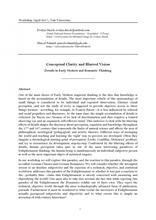Workshop. Conceptual Clarity and Blurred Vision - Details in Early Modern and Romantic Thinking
April 21.: “Conceptual Clarity and Blurred Vision - Details in Early Modern and Romantic Thinking”
Workshop with Yvonne Al-Taie (Yale/Kiel), Frauke Berndt (Vanderbilt/Zürich), Rüdiger Campe (Yale), Evelyn Dueck (UPenn/Neuchâtel), Christian Metz (Cornell/Frankfurt a. M.), Marcel Schmid (Yale/Zürich), Nikolaus Wegmann (Princeton), Kirk Wetters (Yale).
Organized by: Evelyn Dueck, Marcel Schmid
Download the workshop program below.
Abstract
One of the main theses of Early Modern empirical thinking is the idea that knowledge is
based on the accumulation of details. The most important vehicle of this epistemology of
small things is considered to be individual and repeated observation. Distinct visual
perception (and not the study of texts) is supposed to provide objective access to those
things because—according, for example, to Francis Bacon—it is less influenced by cultural
and social prejudices and discourses. At the same time, the simple accumulation of details is
criticized (by Bacon too) because of its lack of discrimination and thus requires a trained
observing eye and an organized, self-reflexive mind. This endeavor to deal with the blurring
effects of details shapes the discourse about perception, cognition and knowledge throughout
the 17th and 18th century that transcends the limits of natural science and affects the area of
philosophical, sociological (pedagogical) and artistic theories. Different ways of arranging
the world and teaching and learning the ‘right’ way to perceive are developed. Often they
imagine a chronological starting point of perception (Locke, Condillac, Molyneux’ problem)
and try to reconstruct its development step-by-step. Confronted by the blurring effects of
details, human perception takes part in one of the most interesting paradoxes of
Enlightenment thinking: the human being is simultaneously an individual, subjective person
as well as the most important object of statistical enquiry.
In our workshop we will explore this paradox, and the reaction to this paradox, through the
so-called German Classics and German Romantics. We will consider whether the attempted
retreat to an absolute subjectivity and the rejection of a technical, objective, and statistical
worldview addresses this paradox of the Enlightenment or whether it was just a reaction to
the—probably false—claim that Enlightenment is merely concerned with measuring and
objectifying the world? One must also to take into account the fact that while rejecting this
paradox of the Enlightenment the Romantics exhibit one of there own: They reject the
technical, objective world through the most technologically advanced form of publication:
journals. Furthermore it must be wondered to what extent the successors of Enlightenment
actually juxtaposed subjectivity and objectivity and to what extent this is simply an
invention of 20th century historians?
Event time: Friday, April 21, 2017 - 2:00pm to 7:30pm
Location: WLH 309 William Harkness Hall, 100 Wall Street, New Haven, CT
Organized by: Evelyn Dueck & Marcel Schmid
Moderation: Kirk Wetters
2pm Start
Introduction: Evelyn Dueck & Marcel Schmid
2:30pm Christian Metz
(„Literarische Unschärfe. Barthold Heinrich Brockes Detailgedicht Die Seifenblase“)
2:45pm Discussion
3:10pm Frauke Berndt
(„Baumgarten – im Detail“)
3:25pm Discussion
3:50pm Coffee Break
4:10pm Nikolaus Wegmann
(„Detailbeobachtung im Medium des Sich-Selber-Aufzeichnens“)
4:25pm Discussion
4:50pm Yvonne Al-Taie
(Von der visuellen Unbestimmtheit zur bildlichen Unendlichkeit. Sprachtheorie und Sprachdenken bei Johann Gottfried Herder und Friedrich Schlegel.)
5:05pm Discussion
5:30pm Rüdiger Campe
(„Wahrscheinlichkeit und Fehler - Anmerkungen zu Lambert”)
5:45pm Discussion
7pm Dinner
